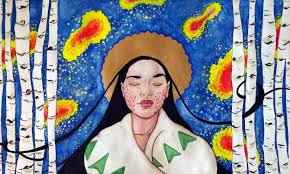Things That Go Bump in the Night
 |
| St. Kateri Tekakwitha Google Image |
A monk at Conception Abbey in Missouri told this well-known story in a homily at a Mass I viewed online.
In a rite of passage, a native-American father takes his son into
the forest and blindfolds him. He requires the boy to sit on a stump the whole
night and not remove the blindfold until the rays of the morning sun shine
through it. If he survives the night, he is a man.
But he can’t cry out for help, and he can’t tell other boys of
his experience because each lad must come into manhood on his own.
The boy is naturally terrified. He can hear all kinds of noises.
Wild beasts
must surely be all around him. Maybe even some human might do him harm. The
wind blows the grass and earth, and shakes his stump, but stoically, he never
removes the blindfold.
Finally, after a horrific night, the sun appears and he removes
his blindfold. He discovers his father sitting on the stump next to him,
apparently there throughout the night.
(July 14, by the way, was the feast day of St. Kateri Tekakwitha, the first native-American to be declared a saint. An Algonquin-Mohawk woman who lived in New York State in the late 1600s.)
Much More Than "Bumps"
Life is full of terrors, and they seem much more than “bumps.” Worry
and fear are our constant companions. What if a family member or I contract COVID-19?
What if I lose my job? What if my children get sick or die? What if I can’t make
my house payment or pay the rent? What if I have to go into a nursing home?
Then, there are the less material concerns. I’ve written about
this before, but I believe it’s relevant and moving. In his famous book about Alzheimer’s
Disease, “Aging with Grace: What the Nuns’ Study Can Teach Us about Leading
Longer, Healthier and More Meaningful Lives,” Dr. David Snowden tells this
story from his exhaustive research on the lives of nuns with the disease.
An elderly nun in the early stages of Alzheimer’s laments to a
younger sister, “Oh sister, I’m afraid I’ll forget about Jesus.” The younger
sister replies, “Don’t worry. Jesus won’t forget about you.”
 |
| Google Image |
We have a hard time accepting the words of Jesus himself, immortalized in the gospel of Luke.
“Therefore I tell you, do not be anxious about your life, what
you shall eat, nor about your body, what you shall put on. For life is more
than food, and the body more than clothing.” Jesus urges his followers not to
“be anxious of mind,” saying that people who are indifferent about God are full
of fear and worry but not people of faith. “Instead,” he says, “seek his
kingdom….”
All this may sound trite, even for people who are committed to
faith. It doesn’t seem practical or realistic. I believe that’s because it
isn’t “the way of the world” and many of us are much more tuned into that world
than we are to the spiritual, where we sometimes feel like fish out of water.
God Is Ultimately in Charge
Practically speaking, faith requires effort. It requires study
and prayer and a determination to always come back to what we know by faith:
that God is ultimately in charge, that he/she is a father/mother who loves us, has
our best interests at heart and, in the end, will take care of us.
And, unlike the native-American dad, God is wherever we are, in us
and around us.
“Where can I go from your spirit or where can I flee from your
face?” asks the author of Psalm 138 (in Catholic bibles). “If I climb the
heavens, you are there. If I lie in the grave, you are there. If I take the
wings of the dawn and dwell at the sea’s furthest end, even there your hand
would lead me, your right hand would hold me fast.”



Comments
Post a Comment